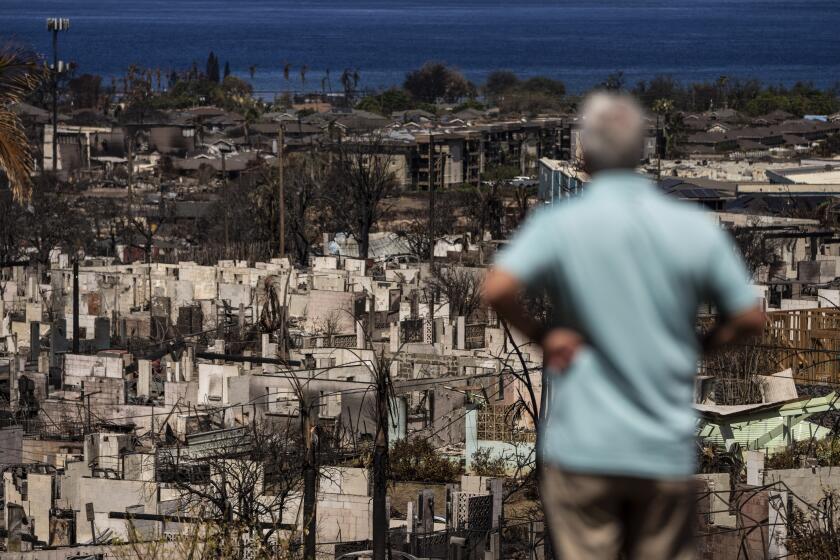Britain Devotes a Day to Holocaust Victims
For many decades after World War II, Jewish Holocaust survivors in Britain wanted to bury the past, while British veterans saw no reason to dwell on the evils they had fought to crush. The British government wanted not to humiliate a defeated Germany, but to enlist it in the Cold War against communism.
As a result, the Nazi extermination of Jews and other perceived enemies was relegated to history books. British schoolchildren generally did not study the Holocaust, museums did not examine it, and politicians did not discuss it.
This is changing at the turn of the 21st century, as can be seen in last summer’s opening of a permanent Holocaust Exhibition at the Imperial War Museum and in Britain’s first national Holocaust Memorial Day today.
Prime Minister Tony Blair, Prince Charles and opposition Conservative Party leader William Hague are to head the list of dignitaries at a nationally televised ceremony billed as a time for remembering genocide. They will be accompanied by survivors of the Holocaust and of massacres in Cambodia, Rwanda and Bosnia-Herzegovina.
Queen Elizabeth II won’t be able to attend because of a previous engagement in the countryside, where she is on vacation. Other events will be held in schools and cities around Britain.
Critics dismiss the national commemoration as a display of Blair’s excessive political correctness. Some Jewish leaders say they fear a trivialization of the genocide with a Princess Diana-style event reminiscent of the aftermath of her 1997 death in a car crash. Some historians charge that adopting the European Union’s designated remembrance day is inappropriate for Britain.
“Holocaust memorial days are for countries that have something to apologize for,” WWII historian John Keegan said. “The wartime generation feels that they went off and fought Hitler from Day One until he committed suicide and that was their contribution. They don’t feel they have anything to atone for. I don’t think Britain has anything to apologize for.”
But supporters say the commemoration and the Holocaust Exhibition--both of which were initiated by non-Jews--represent a significant shift in the country’s moral climate toward viewing human rights issues as the responsibility of the international community.
“There is no question of Britain atoning--if not for Britain, I would be dead. We all would be dead,” said Greville Janner, a Jewish leader and member of the House of Lords. “This is about the government deciding it is right and appropriate to remember the tragedy of the Holocaust not only for its own sake but as a beacon for future generations.
“It says that if you allow a racist dictator to take charge of your country, this is what can happen to you.”
Sweden and Italy also will hold Holocaust observances for the first time today, on the date of the Russian liberation of Auschwitz-Birkenau death camp. Germany has long held annual events for collective national reflection on the crimes and atrocities of the Third Reich. To mark the day this year, the Survivors of the Shoah Visual History Foundation and publisher Cornelsen Verlag have issued a CD-ROM catalog of Holocaust victims’ testimonials--a fraction of the 51,000 survivor interviews recorded by the project, founded by filmmaker Steven Spielberg--for use in German high schools.
Britons, meanwhile, are taking a closer look at their own history of anti-Semitism and at how much Britain knew about the Holocaust during the war. The land of the Industrial Revolution is examining how industrial methods were employed for mass extermination, and is trying to draw lessons from that.
In the Imperial War Museum’s Holocaust Exhibition--after footage of Hitler speaking to adoring crowds and of Joseph Goebbels promising to “shut their lying Jewish mouths”--there is a timeline of European anti-Semitism. The first known case of “blood libel,” in which Jews in Norwich, England, were falsely accused of killing a Christian boy for ritual purposes, was in 1144, it says. In 1290, England expelled its Jews, who were not readmitted for nearly 400 years, until 1655.
In observance of Holocaust Memorial Day, the city of Leicester formally renounced a nearly 800-year-old ban on Jews that was put in place by Simon de Montfort, the father of Parliament. Montfort, who was also the earl of Leicester, issued the ban in 1231, forcing landlords to pledge to keep Jews out of town. It is no longer enforced in the multiethnic city but remained on the books.
The Holocaust Exhibition, meanwhile, uses a top-secret document to illustrate that the British government had known of the Nazi extermination policy and large-scale massacres of Jews since at least December 1942. “But the information had to be kept secret, or the Germans would have known their codes had been broken,” the display notes.
There has been debate about whether the Allies could have done more to stop the killing, such as bombing the railways to Auschwitz. The British government apparently believed at the time that the best way to stop the genocide was to win the war.
The exhibition, far smaller in scale than the memorial in Washington, contains a 35-foot model of Auschwitz, all in white and frozen in a moment of processing thousands of new arrivals. Prisoners are seen disembarking the trains and lining up for selection, to be sent with the point of a finger to work or death.
“It took me maybe 20 years to start talking about what I went through,” Auschwitz survivor Freddie Knowler says in a video at the end of the exhibition. At dinner one night, his daughter complained that his children knew he had been in the camps but didn’t know anything about the experience. “If I can’t tell my own children about it, how can they tell their children so the world will know what the Germans, the Nazis, did to us Jews?” he says.
This is also the point of Holocaust Memorial Day, according to Andrew Dismore, a Labor Party member of Parliament who introduced the bill for the annual commemoration last year after a trip to Auschwitz.
“I come from a traditional English background, a small town in the northeast. My father was in the navy in World War II, but the Holocaust wasn’t part of our past,” Dismore said. “It wasn’t really discussed.”
He ran for Parliament in 1997 in Hendon, an area of North London with a large Jewish community, and learned that there was a continuous internal discussion about the Holocaust that he felt should be aired to all Britons. Dismore argues that the fact Britain didn’t experience occupation makes study all the more necessary.
The debate over the Holocaust Memorial Day illustrates its value, said David Cesarani, a professor of modern Jewish history at Southampton University and a member of the memorial day steering group.
Writing in the Guardian newspaper this week, Cesarani said this is all part of the retelling of Britain’s history to include its immigrants and minorities.
The day “begs questions about Britain’s role in recent international crises and the treatment of asylum-seekers. Yet it also can give those who have found refuge in this country a sense that their scarred memory has become part of our national heritage,” he wrote. “By remembering genocides, we are acknowledging the way that past catastrophes have helped to create a multiethnic Britain.”
*
Times staff writer Carol J. Williams in Berlin contributed to this report.
More to Read
Start your day right
Sign up for Essential California for news, features and recommendations from the L.A. Times and beyond in your inbox six days a week.
You may occasionally receive promotional content from the Los Angeles Times.






